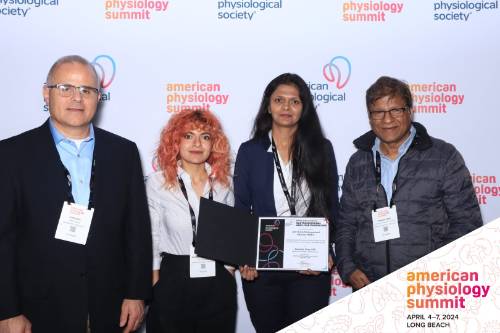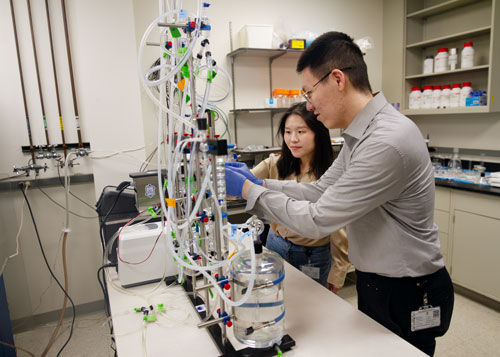BME Members Present, Win Awards at the 2024 American Physiology Summit
April 15, 2024
Founded in 1887, the American Physiological Society (APS) is an organization that fosters a community of multidisciplinary scientists who work together to advance the different branches of physiology and strive to solve the major issues affecting life and health across the globe. In 2023, APS revealed their new annual meeting, the American Physiology Summit, where over 3,000 researchers, educators, and students from around the world convene to discuss the biggest medical issues impacting the field of physiology.
The 2nd American Physiology Summit, held in Long Beach, California from April 4–7, 2024, showcased 80 science sessions, two general sessions, eight game-changer sessions, and poster presentations. Among the presenters were PhD student Taheri Pardis, MSTP/PhD student Christopher Monti, and Postdoctoral Researcher Dr. Devanshi Dave from the Marquette-MCW Joint Department of Biomedical Engineering.
Pardis presented their poster titled, “Mitochondrial function in lungs of rats with different susceptibilities to hyperoxia-induced Acute Respiratory Distress Syndrome (ARDS).” This study aimed to assess lung tissue mitochondrial bioenergetics in rats preconditioned to hyperoxia (H-T) and hyperoxia susceptibility (H-S) states.
Monti presented their poster titled, “Computational modeling of sodium fluorescein disposition in ex vivo, machine-perfused livers with ischemia-reperfusion injury.” Using computational modeling, this study analyzed time course measurements of a biliary clearance tracer molecule (sodium fluorescein, SF) and the effect of warm ischemia time (WIT), a proxy for ischemia reperfusion injury (IRI).
Dr. Dave presented their poster titled, “Sex-Specific Mitochondrial Bioenergetics Differences in Heart and Kidney Cortex.” Their study focused on investigating and identifying the sex-specific differences in mitochondrial respiration and membrane potential in the heart and kidney cortex of rats.
 In addition to their poster presentation, Dr. Dave was presented with The John Forte Distinguished Abstract Award for their abstract entitled, “Altered Hepatic Mitochondrial Bioenergetics and Oxidant Emission with Ischemia and Reperfusion.” This study aimed to assess the impact of IRI on liver mitochondrial function and oxidative stress and its implications for normothermic machine perfusion (NMP) viability criteria in liver transplantation (LT). Mitochondrial bioenergetics parameters, including oxygen consumption rate (OCR), membrane potential (dPsi), and hydrogen peroxide (H2O2) emission, were evaluated in control livers and those with IRI using different substrate combinations. Results showed that IRI negatively affected mitochondrial function, leading to decreased OCR and dPsi, especially in response to adenosine diphosphate (ADP) addition. Higher H2O2 emission was observed during IRI, suggesting increased oxidative stress. These findings highlight the importance of considering mitochondrial bioenergetics in assessing liver viability for transplantation, as compromised mitochondrial function during IRI can impact energy metabolism and lactate/pyruvate ratio.
In addition to their poster presentation, Dr. Dave was presented with The John Forte Distinguished Abstract Award for their abstract entitled, “Altered Hepatic Mitochondrial Bioenergetics and Oxidant Emission with Ischemia and Reperfusion.” This study aimed to assess the impact of IRI on liver mitochondrial function and oxidative stress and its implications for normothermic machine perfusion (NMP) viability criteria in liver transplantation (LT). Mitochondrial bioenergetics parameters, including oxygen consumption rate (OCR), membrane potential (dPsi), and hydrogen peroxide (H2O2) emission, were evaluated in control livers and those with IRI using different substrate combinations. Results showed that IRI negatively affected mitochondrial function, leading to decreased OCR and dPsi, especially in response to adenosine diphosphate (ADP) addition. Higher H2O2 emission was observed during IRI, suggesting increased oxidative stress. These findings highlight the importance of considering mitochondrial bioenergetics in assessing liver viability for transplantation, as compromised mitochondrial function during IRI can impact energy metabolism and lactate/pyruvate ratio.
Dr. Dave and Monti are lab members of Dr. Ranjan Dash's Computational Systems Biology Laboratory (CSBL), which employs signal- and system-engineering methodologies alongside experimental measurements to construct multi-scale mechanistic computational models, aiming to enhance understanding of biophysical and biochemical operations in various biological and physiological systems and guide engineering-based interventions.
Pardis is a lab member of Dr. Said Audi’s Computational Lung Physiology Laboratory (CLPL), which focuses on exploring lung physiology across various levels, from molecular to whole-organ and body, using experimental and computational approaches to help develop targeted treatments.
LEARN MORE about the CBSL
LEARN more ABOUT the CLPL

 In addition to their poster presentation, Dr. Dave was presented with The John Forte Distinguished Abstract Award for their abstract entitled, “Altered Hepatic Mitochondrial Bioenergetics and Oxidant Emission with Ischemia and Reperfusion.” This study aimed to assess the impact of IRI on liver mitochondrial function and oxidative stress and its implications for normothermic machine perfusion (NMP) viability criteria in liver transplantation (LT). Mitochondrial bioenergetics parameters, including oxygen consumption rate (OCR), membrane potential (dPsi), and hydrogen peroxide (H2O2) emission, were evaluated in control livers and those with IRI using different substrate combinations. Results showed that IRI negatively affected mitochondrial function, leading to decreased OCR and dPsi, especially in response to adenosine diphosphate (ADP) addition. Higher H2O2 emission was observed during IRI, suggesting increased oxidative stress. These findings highlight the importance of considering mitochondrial bioenergetics in assessing liver viability for transplantation, as compromised mitochondrial function during IRI can impact energy metabolism and lactate/pyruvate ratio.
In addition to their poster presentation, Dr. Dave was presented with The John Forte Distinguished Abstract Award for their abstract entitled, “Altered Hepatic Mitochondrial Bioenergetics and Oxidant Emission with Ischemia and Reperfusion.” This study aimed to assess the impact of IRI on liver mitochondrial function and oxidative stress and its implications for normothermic machine perfusion (NMP) viability criteria in liver transplantation (LT). Mitochondrial bioenergetics parameters, including oxygen consumption rate (OCR), membrane potential (dPsi), and hydrogen peroxide (H2O2) emission, were evaluated in control livers and those with IRI using different substrate combinations. Results showed that IRI negatively affected mitochondrial function, leading to decreased OCR and dPsi, especially in response to adenosine diphosphate (ADP) addition. Higher H2O2 emission was observed during IRI, suggesting increased oxidative stress. These findings highlight the importance of considering mitochondrial bioenergetics in assessing liver viability for transplantation, as compromised mitochondrial function during IRI can impact energy metabolism and lactate/pyruvate ratio.
